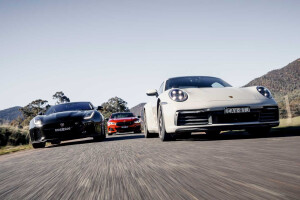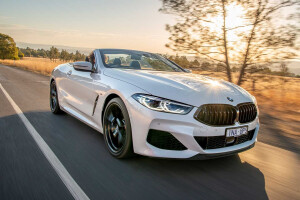Latest Review
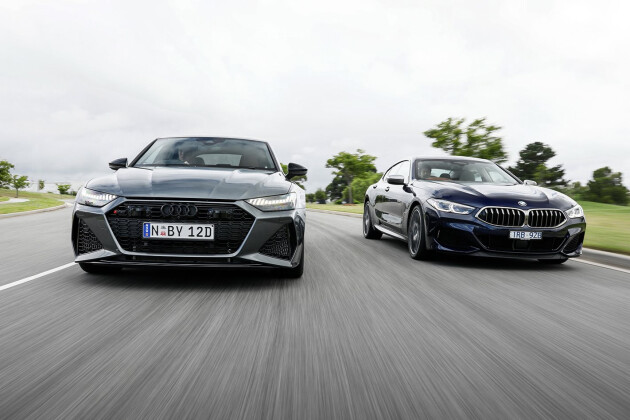
2021 Audi RS7 vs BMW M850i comparison review
Audi’s RS7 Sportback moves into a new realm of purpose and performance, but can it measure up to BMW’s M850i Gran Coupe?
There's always something tantalising about a new RS-badged Audi. It’s not so much the usual appeal to novelty, more the fact that you just don’t know what you’re going to get. It’s almost as if there’s an RS yin and yang, quattro GmbH feeling that having delivered, for example, the wonderful B7 RS4, it was then obliged to restore balance with the woeful B8 RS5 Cabriolet.
So where did the old RS7 Sportback fit into that realm? It was a bit of a quiet achiever, that one, hugely competent in most areas but never really having the spark of personality or attitude to markedly distinguish it from its rival set. In short, it seemed the answer to a question few would conceivably ask.
To that end, Audi retained the fundamentals with this new version of the RS7; a 4.0-litre V8 driving all four wheels through an eight-speed automatic transmission draped in a chiselled liftback body. As ever though, the details make or break it. Like its sibling, the Audi RS6 Avant, the latest RS7 no longer hides its light under a big ol’ bushel. The front end is sharper, it appears to sit lower on its wheels and the haunches are as plumped and swollen as the front end of a MAFS bride.
The pugnacious, foursquare stance of the Audi delivers in terms of road presence, especially in contrast to the lower-key BMW M850i xDrive Gran Coupe. Sitting on a wheelbase of 3023mm versus the Audi’s 2934mm, the Munich express is a long, low and lithe thing, its bulk disguised by some svelte detailing. Whereas there’s an element of rightness about the RS7’s shape that rests easily on the eye, the 8 Series Gran Coupe is a more complex, challenging shape, with some interesting details, such as the reinterpretation of the Hofmeister kink in the rearmost side window that looks almost Stinger-like.
At this point you’re probably asking why we’ve lined up the very pinnacle of the Audi A7 range with the penultimate driving machine in the 8 Series Gran Coupe walk-up. Fair question. It’s basically because the big Eight is so much more expensive than the equivalent Audi. As it stands, without taking options into account, the Audi RS Sportback retails at $224,000. The M850i xDrive Gran Coupe carries a price tag of $277,900, a not insignificant premium of $53,900. Were we to have brought the M8 Competition Gran Coupe out to play, that would have been $354,900 worth of jingle-jangle or, to put it another way, only a couple of option choices off the prices of an RS7 and a TT RS combined.
In a gallant effort to level the playing field, Audi has thrown a few extras at this particular car. As well as 22” V-spoke alloy wheels and black-keyed Audi badging, this example gets the $2850 RS Sports suspension plus, ditching the standard air suspension in lieu of coil springs and the three-way adaptive damping of Audi’s Dynamic Ride Control. It also gets the RS Dynamic package plus, which includes monster carbon-ceramic brakes and a faintly academic lift in the top speed to 305km/h. There’s also the Sensory package, which features better quality trim materials inside, heated rear seats, sunshades and a Bang and Olufsen 3D stereo. Price as tested: $258,050.
BMW has stuck a little closer to the list price, the importers adding just a couple of options to the test car. Piano black interior finish adds $200 while the garish Merino leather interior and ivory white, tartufo and black with an Alcantara headliner is a hefty $9400 ask, the final bill coming to $287,500.
On a strict bang for your buck basis, the RS7 Sportback appears the more convincing case. With 441kW and 800Nm, it’s within a sniff of a $409,500 Porsche Panamera Turbo S (463kW/820Nm). Had Mercedes-AMG made an E63 Coupe with the 450kW/850Nm V8, that would have been comparable but as it stands, the pinnacle of that range is the $179,335 six-pot 320kW/520Nm E53 AMG which would have been massacred by the RS7.
Despite its 4.4-litre engine boasting another 401cc of swept capacity over the RS7, the BMW can’t match the Audi’s outputs. Nevertheless, 390kW and 750Nm is nothing to be sneezed at. Of course, these are the exact same outputs of another elegant five-seat notchback in BMW’s range, the M550i xDrive sedan, a car which retails at $125,000 less (or $140,000 for the marginally more austere Pure version) and carries 80kg less timber up the strip, but that’s an argument for another day. Still, the BMW is lighter than the Audi, despite the latter’s much-vaunted aluminium componentry, the M850i tipping the scales at 1995kg before options and the Audi 2065kg.
Yet having swapped into the RS7 for our test route, it’s clear within the first few metres that it feels lighter and more alert. Much of that is down to the steering, which feeds more back through its thinner rim than the rather taciturn 8 Series, and which also dives quickly for the apex thanks to four-wheel steer. The overall effect is to trick you into thinking that the Ingolstadter is carrying about 250 kegs less. Like most of these sensory sleights of hand, however, the illusion is transitory, so when driven hard the two cars begin to show their raw talent is a more unfiltered manner.
The route chosen was one that would certainly punt both vehicles a long way outside anything that could be described as their natural comfort zone. The rugged mountain twisties of Reefton Spur are about as far from the micron-burnished hotmix of this pair’s autobahn homes but act as the perfect laboratory to pare things back to handling fundamentals.
The Audi feels quicker. You can brake later, it’s sharper to the apex and more communicative in turn in. What it never does is settle cleanly into the corner. Even with its clever suspension, there’s a constant and slightly tiresome bob and patter to the front end, not wholly unlike a 964-gen Porsche 911. There’s also the temptation to utilise the agility of the four-wheel steering by turning late and hard, but this only introduces understeer, not helped by the Audi’s standard Hankook Ventus S1 Evo tyres; rubber we’d put in the good, not great category.
Measure your inputs a little more deliberately and the RS7 feels a smarter thing, allowing you to turn in gently and trail brake modestly, the car just offering an impression of rotation and neutrality. It’s rewarding in a kind of esoteric, chin-stroking manner, if not hugely entertaining. The locking sport differential on the rear axle helps here, and although the usual torque split is 40:60 front-to-rear, the centre diff can send up to 70 per cent of drive to the front hoops or 85 per cent to the rear. While that may make the RS7 Sportback sound like an unreconstructed rear-driver, it never really feels that way.
There are impediments to really enjoying everything that the RS7 could theoretically deliver, too. Ultimate lateral grip of the tyres, despite measuring a chunky 285/30 ZR22 all round, could be better for a range-topper, and then there’s the gearbox logic which, not to put too fine a point on it, is not fit for purpose for spirited driving. Time and again, when left to its own devices, even in the most aggressive RS drive modes, the ’box upshifts to the point where the engine’s spinning at a lethargic 2000rpm, whereupon the throttle has the response of a darted sloth. Take over paddle flapping duties yourself on the tiny silvery tabs and the software will frequently deny downchanges, even when there’s the headroom available to make them. The RS7 really needs around 5000rpm on the dial for meaningful go, which leaves 1750rpm to exploit to the redline.
Climb into the BMW and while it can’t hold station with the Audi in terms of straight-line grunt, it’s clear that this one’s a grower. The initial impression is that the suspension feels far better resolved. In fact, the ride in the M850i is better in its most focused Sport Plus mode than the RS7’s is in Comfort. This planted, settled feel inspires confidence into the braking zone, knowing that the BMW’s superior rebound damping is giving the narrower Bridgestone Potenza S007 tyres (245/35 R20 up front and 275/30 R20 at the back) every opportunity to sniff out grip. There’s no getting away from the fact that, on these test vehicles, the BMW is working with a front tyre contact patch only 85 per cent as big as that of the Audi.
The steering is almost entirely mute when it comes to communicating the granularity of the road surface, but there’s a more natural feel to its slower initial gearing than the RS7 which, combined with the longer travel brake pedal, helps to smooth inputs en route to the apex. Neither car pitches nor rolls excessively for two-tonne monsters, with the BMW cornering a little flatter but the Audi being better resistant to squat on the way out again.
Clicked into Sport Plus mode, the BMW certainly sounds more aggressive, with a real throatiness to the exhaust that’s accompanied by almost AMG-like fusillades from the exhaust. If you want a V8 to really sound a little more typically cross-plane macho, the BMW will certainly appeal. By contrast, the Audi offers either sporty or balanced sound modes for the exhaust, but neither are quite as testosterone-steeped as Munich’s acoustics. The 4.4-litre N63 engine feels gutsy despite making its peak power between 5500-6000rpm at which point it runs into the buffers of the redline.
The reason it feels so sinewy is because the BMW’s torque, whilst not quite reaching the peaks of the Audi’s 4.0-litre, is spread wider, arriving at its 750Nm peak some 250rpm lower and extending another 600rpm higher. Peak power also arrives earlier in the M850i, the Audi only making its 441kW headline figure on a vertiginous summit between 6000 and 6250rpm. The net effect of this is that the BMW feels more muscular and easier to flow on a fast road, despite its on-paper torque and power deficits.
We park at the top of the test route and let the cars tap and ping cool among the stringybarks. The Audi’s implacable carbon brakes, with their red calipers and monster 440mm front discs and 370mm rear rotors have shrugged off the worst we could throw at them. The BMW’s steel rotors smell a little toastier, the torque vectoring by braking system giving the single-piston rears in particular a bit of a workout.
The Audi’s cabin is undoubtedly a lovely place to be, sitting inside double-glazed, acoustically optimised glass, on rich, buttery RS leather seats. There are the technical trim fillets in the dash and doors that aren’t cheesy carbon but gives the impression of it, the tactile perforated leather wrap for the steering wheel and gear shifter and the considered ergonomics that make operating even some of the more complex controls intuitive. It’s worth remembering that this car has 11 grand’s worth of Sensory package, which extends the Alcantara and leather trim.
The big twin touch-screen setup means that physical buttons are at a premium, which won’t appeal to all, and if you’re at all phobic about fingerprints on screens, you’re going to have a bit of a moment or two with the RS7. There’s also decent rear accommodation for adults and a practical hatchback body, although there’s no spare of any sort under the boot floor.
The BMW’s driving position is better, with the seat motoring all the way down to the point where it feels as if your fundament could be terminally ruined by a poorly-fitted cat’s eye when changing lanes. The interior colour combo of this particular car is best summarised by ‘other palette choices are available’ and the dial pack is nowhere near as cohesive and smart as the Audi.
Likewise some of the interior touchpoints feel a little underbaked. The plastic gear shifter is creaky and cheap-feeling, with a nasty unfinished joint at exactly the point on its anterior face where your fingertips grasp it. Likewise, the rotary controller feels plasticky rather than the cool metal you’d hope for.
The rear isn’t as practical as the Audi either, with the raked roofline and dual-pane sunroofs robbing headroom. There’s actually more legroom, but such is the pinch overhead that it’s not really possible to exploit it. Then there’s the fact that there are three seatbelts fitted across the rear bench but a huge wide centre console that runs all the way to the seat which means that anyone drawing the short straw and getting the middle berth has to sit splay-legged.
Despite this run of negatives, strangely, the BMW feels the more bespoke product, almost as if it’s the car with more specialist bones rather than a dressed-up cheaper platform. Perhaps it’s the extrovert immediacy of the RS7 that instantly displays its key attributes and then has nothing left to give, whereas the M850i feels a little coyer in revealing its talents. Either way, the Munich car feels more tasteful, more old-money and less anxious to please and there’s something endearing about that.
Ultimately, one of these cars is quicker, more powerful, more practical, easier to operate and a whole lot cheaper than the other. That the RS7 was also markedly more economical, returning 15.7L/100km versus the BMW’s 17.8L/100km also counts in its favour. That’s a hefty 12 per cent more frugal, thanks in part to its 48v electrical architecture which reduces alternator drag and the cylinder on demand tech which shuts down cylinders 2, 3, 5 and 8 when under low to medium load. That also feeds into the issue of range, the Audi’s 73-litre tank giving it a nominal on-test range of 465km while the BMW, in the same test conditions, would have seen its 68-litre tank depleted in just 382km.
Normally, the RS7’s tally of attributes would make a test like this something of a slam dunk, but the BMW’s superior ride quality, greater bandwidth in its drive modes, more charismatic powerplant and cleverer transmission means that it claws its way back into contention. Does it do enough to scalp an against-the-odds win? Not quite. The Audi RS7 Sportback is just too multi-talented for that.
Had there been greater parity between the prices of the M850i and the RS7, we could have made a broader case for a horses for courses verdict, positioning the BMW as the superior GT car for two, and the RS7 as the more practical, yet dynamically livewire entertainer. That $54K price advantage in the Audi’s favour buys it all sorts of credit though. Buys it a win here as well. Ingolstadt has delivered a very good RS model. We await Audi Sport’s consequent counter-clogger.
Technical Specs
Audi RS7
Body: 5-door, 5-seat liftback
Drive: All-wheel
Engine: 3996cc V8, DOHC, 32v, twin-turbo
Bore x stroke: 86.0 x 86.0mm
Compression: 10.0:1
Power: 441kW @ 6000-6250rpm
Torque: 800Nm @ 2050-4000rpm
Power/Weight: 214kW/tonne
Transmission: 8-speed automatic
Weight: 2065kg
Suspension: multi-links, coil springs, adaptive dampers, anti-roll bar (f),
multi-links, coil springs, adaptive dampers, anti-roll bar (r)
L/W/H: 5009/1950/1424mm
Wheelbase: 2930mm
Tracks: 1668/1650mm
Steering: Electrically assisted rack-and-pinion
Brakes: 440mm ventilated discs, ten-piston fixed calipers (f), 370mm ventilated discs, single piston floating calipers (r)
Wheels: 22 x 10.5-inch (f/r)
Tyres: 285/30 ZR22 (f/r) Hankook Ventus S1 evo
Price: $224,000
Pros: Immediacy of response, intuitive controls; pace; value for money
Cons: Tyre wouldn’t be our first choice; nervy ride quality; sheer size
Rating: 4.0/5
BMW M850i
Body: 4-door, 5-seat sedan
Drive: All-wheel
Engine: 4395cc V8, DOHC, 32v, twin-turbo
Bore x stroke: 89.0 x 88.3mm
Compression: 10.0:1
Power: 390kW @ 5500-6000rpm
Torque: 750Nm @ 1800-4600rpm
Power/Weight: 195kW/tonne
Transmission: 8-speed automatic
Weight: 1995kg
Suspension: double A-arm, coil-springs, anti-roll bar (f), multi-links, coil springs, anti-roll bar (r)
L/W/H: 4851/1902/1346mm
Wheelbase: 2822mm
Tracks: 1627/1642mm
Steering: Electrically assisted rack-and-pinion
Brakes: 395mm ventilated discs, four-piston fixed calipers (f), 380mm ventilated discs, single piston floating calipers (r)
Wheels: 20 x 8.0-inch (f), 20 x 9.0-inch (r)
Tyres: 245/35 R20 (f), 275/30 R20 (r) Bridgestone Potenza S007
Price: $277,900
Pros: Sumptuous ride; beefy powerplant; sense of occasion
Cons: Compromised rear space; fussy dials; modest range
Rating: 4.0/5
News
-
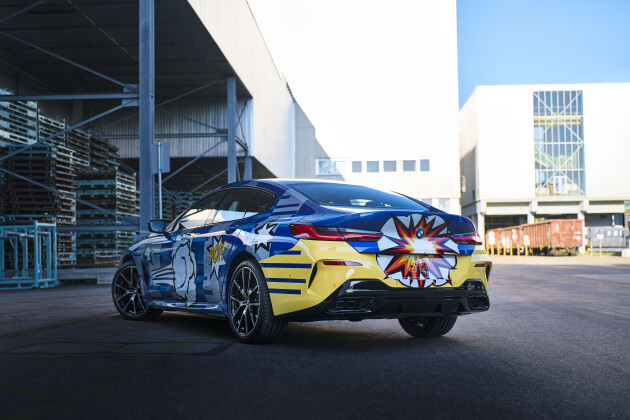 News
NewsBMW reveals new Art Car by Jeff Koons – one of the 99 cars is bound for Australia
BMW says it’s the most “elaborately designed vehicle” ever produced in its 106-year history – and it's headed here soon
-
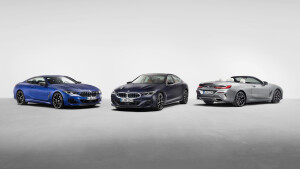 News
News2022 BMW 8 Series pricing and specifications
BMW has given the 8 Series its mid-life refresh, with new design elements inside and out
-
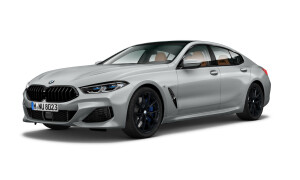 News
NewsBMW Australia announces late-2021 arrival of 8 Series Heritage Edition
Just nine vehicles will be coming to the local market
-
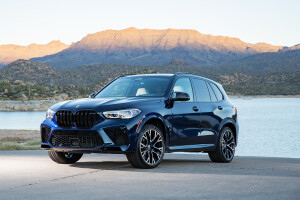 News
NewsBMW recalls 2019-2020 models over ABS fault
Despite 11 models being affected, only 49 vehicles are under recall
-

2021 Audi RS7 vs BMW M850i drag race
-
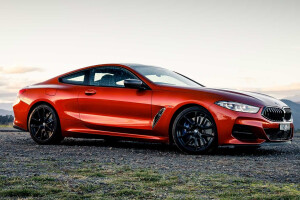
BMW M850i beats a first-gen Audi R8 V10 Plus in performance testing
-
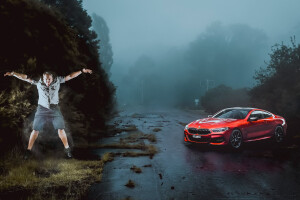
BMW M850i: Spiritual enlightener
-
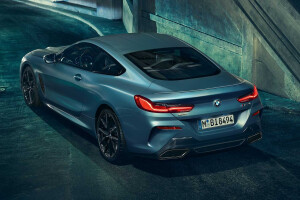
2019 BMW M850i First Edition pricing confirmed for Australia



